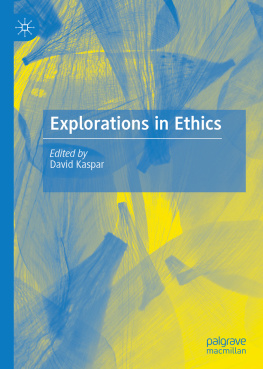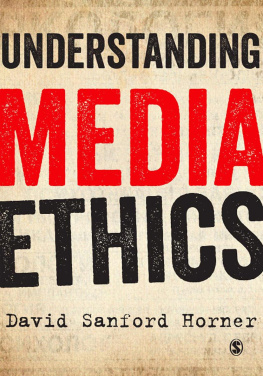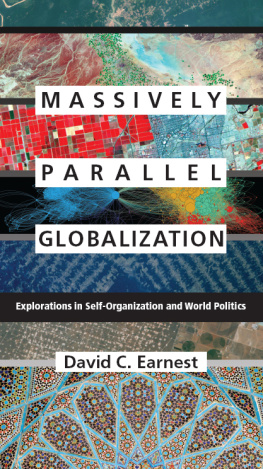David Kaspar - Explorations in Ethics
Here you can read online David Kaspar - Explorations in Ethics full text of the book (entire story) in english for free. Download pdf and epub, get meaning, cover and reviews about this ebook. publisher: Springer International Publishing, genre: Politics. Description of the work, (preface) as well as reviews are available. Best literature library LitArk.com created for fans of good reading and offers a wide selection of genres:
Romance novel
Science fiction
Adventure
Detective
Science
History
Home and family
Prose
Art
Politics
Computer
Non-fiction
Religion
Business
Children
Humor
Choose a favorite category and find really read worthwhile books. Enjoy immersion in the world of imagination, feel the emotions of the characters or learn something new for yourself, make an fascinating discovery.
- Book:Explorations in Ethics
- Author:
- Publisher:Springer International Publishing
- Genre:
- Rating:5 / 5
- Favourites:Add to favourites
- Your mark:
- 100
- 1
- 2
- 3
- 4
- 5
Explorations in Ethics: summary, description and annotation
We offer to read an annotation, description, summary or preface (depends on what the author of the book "Explorations in Ethics" wrote himself). If you haven't found the necessary information about the book — write in the comments, we will try to find it.
Explorations in Ethics — read online for free the complete book (whole text) full work
Below is the text of the book, divided by pages. System saving the place of the last page read, allows you to conveniently read the book "Explorations in Ethics" online for free, without having to search again every time where you left off. Put a bookmark, and you can go to the page where you finished reading at any time.
Font size:
Interval:
Bookmark:


Cover illustration: Marina Lohrbach_shutterstock.com
This Palgrave Macmillan imprint is published by the registered company Springer Nature Switzerland AG.
The registered company address is: Gewerbestrasse 11, 6330 Cham, Switzerland
To all the explorers in ethics
Explorations in Ethics is the product of several meetings of the Speculative Ethics Forum in New York City. That conference has as its explicit remit the fostering of new, and in some respects still developing, ideas in moral philosophy, broadly conceived. David Kaspar , who organized the meetings of the Forum, was driven by the sense that the field of ethics had become too tame, too rote, and too snugly fitted into the predictable confines of professional philosophy. As he saw it, moral philosophy was in danger of growing stale. What was needed, he reasoned, was a forum where moral philosophers could push the envelope and take a few risks of the kind that would in other venues invite reprimand. In calling for speculative work, however, the Forum was nonetheless devoted to the highest standards of philosophical quality; the aim was to provide a site where top-notch moral philosophy could be done beyond the restrictive expectations and requirements of the standard professional venues.
There is some irony in the fact that moral philosophy today should need a safe space for thinking outside of the professional strictures. After all, it wasnt all that long ago that ethics, and explicitly normative theorizing more broadly, was nearly banished from the profession. According to the familiar account of these matters (the true story is far more complicated), the positivist strand in analytic philosophy that dominated the profession in the decades following World War II had declared the traditional enterprise of ethics bunk. On this view, much of ethics was helplessly ensnared in presuppositions and premises that transcended a properly naturalistic worldview and thus was to be dismissed as metaphysical nonsense. What remained in the wake of this purge was a utilitarianism of the flat-footed cost-benefit kind, which rendered ethics a branch of social science (particularly, economics). In either case, moral philosophy was largely squeezed out of philosophy proper.
John Rawls is often credited with turning things around (once again, the true story is more complicated). His monumental A Theory of Justice would have been half its length were it not for the need to make the case for thinking of normative theorizing in a nonutilitarian mode as bona fide philosophy. As it stands, that work contains much that is innovative, surprising, and, well, speculative. The important thing is that Rawls had created the conditions under which the traditional ambitions of moral philosophy could be reengaged.
But successes often produce new opportunities for failure, and it seems to me that by the first decade of the new millennium, moral philosophy had carved itself into a few ruts. This, of course, is not to say that the work from this period is not excellent of its kind. Indeed, it tends to be of very high quality. The claim rather is that the work appearing in the most prestigious venues and thus getting the greatest uptake in the profession tended to fit a mold, where a certain range of problems were to be taken as especially pressing and a certain range of argumentative moves were to be taken as decisive. The trouble, it seems to me, is not so much with that set of problems or those methods of argumentation, as with the fact that other problems, pursued by different means, were neglected or at least pressed to the margin of the field. That this homogenization of the problems and methods of moral philosophy should have corresponded with sweeping cultural and technological shifts, and thus with the emergence of entirely new sites of moral concern, is curious.
In this volume, then, one finds an impressive line-up that includes well-established scholars alongside up-and-coming voices in moral philosophy. The range of topics is inspiring. As bookends, we have Katja Vogt and Peter Simpson , both of whom offer a contemporary spin on the Ancients. Vogts opening chapter that reaches back to Platos Euthyphro , arguing that the classic dilemma provides an argument for adopting a two-pronged theory of value according to which some values are as the modern realists claim, while others are best understood in anti-realist terms. In his closing contribution, Simpson takes up, and takes seriously, the discussions in Plato and Aristotle of the impact of music on the soul, arguing ultimately that music played in a tempered scale , as nearly all Western music since Bach is, is morally corrupting.
In between these two exciting chapters (and it should be noted that Simpson ventures beyond exciting to provocative), there are more highlights than I have space to mention. Standouts are Tarasenko-Strucs examination of invisibility and misrecognition, von Kriegsteins redeployment of Nozicks experience machine thought experiment, and Heneys portrayal of the particularism-generalism dispute as mappable along distinct reasons and practices axes. In addition, one is struck by the seemingly fortuitous threads that tie certain chapters together: questions about action-guidance and the distinction(s) between moral and prudential reasons; interest in moral psychology and the cultivation of a moral sense; challenges occasioned by the tendency to theorize from the perspective of ideal agents ; and, broadly speaking, the idea that its time for moral philosophy to more firmly return to lifes Big Questions. Suffice it to say that every one of these chapters contains something fresh and stimulating.
Font size:
Interval:
Bookmark:
Similar books «Explorations in Ethics»
Look at similar books to Explorations in Ethics. We have selected literature similar in name and meaning in the hope of providing readers with more options to find new, interesting, not yet read works.
Discussion, reviews of the book Explorations in Ethics and just readers' own opinions. Leave your comments, write what you think about the work, its meaning or the main characters. Specify what exactly you liked and what you didn't like, and why you think so.












